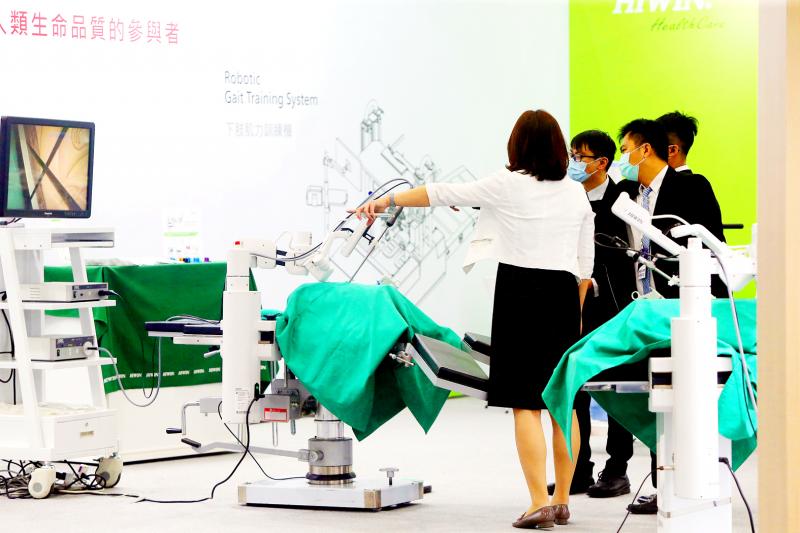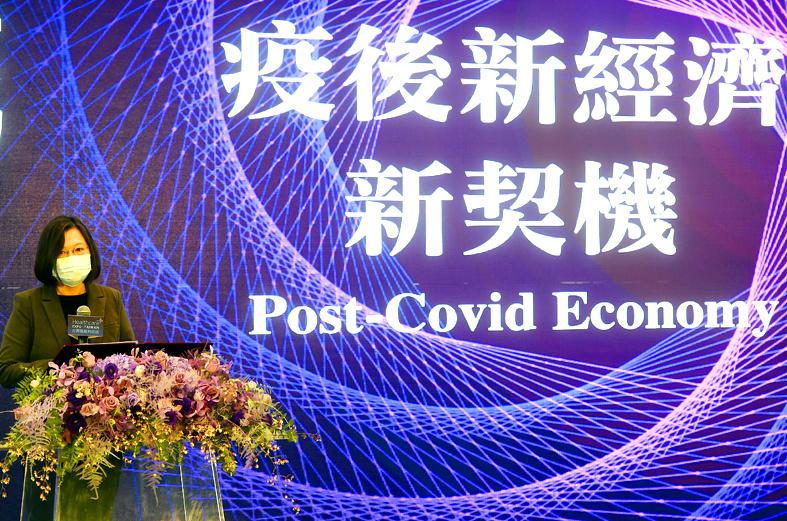More than 500 exhibitors are showcasing their latest innovations at the Taiwan HealthCare Expo, which began at the Nangang Exhibition Center in Taipei yesterday.
Tech companies developing smart medicine products are represented alongside medical supply and pharmaceutical companies, and hospitals.
Diverse topics in healthcare have been addressed, including Kaohsiung Medical University’s virtual reality “nostalgia therapy” for people with Alzheimer’s disease and Chimei Hospital’s 3D printed device to prevent air from getting into feeding tubes.

Photo: CNA
However, the spotlight was on products that incorporate the latest 5G, high-resolution sensor chips and Internet of Things technology, as well as developments to address the COVID-19 pandemic.
LCD panel maker AU Optronics Corp (友達光電) unveiled a high-resolution surgery display, while Taipei Medical University Hospital showed off a contactless COVID-19 treatment platform that allows medical professionals to monitor a patient’s condition remotely, reducing contact and thus infection risks.
President Tsai Ing-wen (蔡英文), in the keynote speech at the opening ceremony, said that Taiwan’s stellar performance in combating COVID-19 presents it with a chance to play a more prominent role in the world’s medical supply chains.

Photo: Chien Jung-feng, Taipei Times
“Taiwan can help, and not just with masks,” Tsai said. “When we develop our medical technology, we are not only ensuring the health of our citizens, but contributing to the well-being of the world.”
Taiwan displayed “capability” and “confidence” in the fight against COVID-19, Tsai said, adding that local businesses must “seize the moment” and secure their place in the worldwide medical industry supply chain.
“The supply chain realignments we have seen this year present a chance for Taiwan to become better positioned,” she said.
“Information and communications technology, and the medical/biotech industries are two pillars holding up Taiwanese industry,” Tsai said. “Businesses from those two fields must cooperate to create the digital transition of the medical industry.”
The government must “think hard” about how to support the development of the Taiwanese biotech and medical industries, she said, adding that the government would accelerate the digital transformation of healthcare and secure enough supplies of key raw materials to build up the nation’s healthcare capability.
Still, the government needs to think about what role it is going to play, and what regulations and laws would best serve the digital transition of the medical industry, Tsai said.
“How do we best use our advantage in the information and communication technology sector to make Taiwan the digital medicine hub of the world in the post-COVID-19 pandemic world?” she said.
The expo has brought together 550 companies and organizations, and 150 start-ups for a total of 1,580 booths at the Nangang Exhibition Center’s Hall 1. The fair runs through Sunday.
Additional reporting by CNA

Taiwan’s foreign exchange reserves hit a record high at the end of last month, surpassing the US$600 billion mark for the first time, the central bank said yesterday. Last month, the country’s foreign exchange reserves rose US$5.51 billion from a month earlier to reach US$602.94 billion due to an increase in returns from the central bank’s portfolio management, the movement of other foreign currencies in the portfolio against the US dollar and the bank’s efforts to smooth the volatility of the New Taiwan dollar. Department of Foreign Exchange Director-General Eugene Tsai (蔡炯民)said a rate cut cycle launched by the US Federal Reserve

Handset camera lens maker Largan Precision Co (大立光) on Sunday reported a 6.71 percent year-on-year decline in revenue for the third quarter, despite revenue last month hitting the highest level in 11 months. Third-quarter revenue was NT$17.68 billion (US$581.2 million), compared with NT$18.95 billion a year earlier, the company said in a statement. The figure was in line with Yuanta Securities Investment Consulting Co’s (元大投顧) forecast of NT$17.9 billion, but missed the market consensus estimate of NT$18.97 billion. The third-quarter revenue was a 51.44 percent increase from NT$11.67 billion in the second quarter, as the quarter is usually the peak

The US government on Wednesday sanctioned more than two dozen companies in China, Turkey and the United Arab Emirates, including offshoots of a US chip firm, accusing the businesses of providing illicit support to Iran’s military or proxies. The US Department of Commerce included two subsidiaries of US-based chip distributor Arrow Electronics Inc (艾睿電子) on its so-called entity list published on the federal register for facilitating purchases by Iran’s proxies of US tech. Arrow spokesman John Hourigan said that the subsidiaries have been operating in full compliance with US export control regulations and his company is discussing with the US Bureau of

Pegatron Corp (和碩), a key assembler of Apple Inc’s iPhones, on Thursday reported a 12.3 percent year-on-year decline in revenue for last quarter to NT$257.86 billion (US$8.44 billion), but it expects revenue to improve in the second half on traditional holiday demand. The fourth quarter is usually the peak season for its communications products, a company official said on condition of anonymity. As Apple released its new iPhone 17 series early last month, sales in the communications segment rose sequentially last month, the official said. Shipments to Apple have been stable and in line with earlier expectations, they said. Pegatron shipped 2.4 million notebook